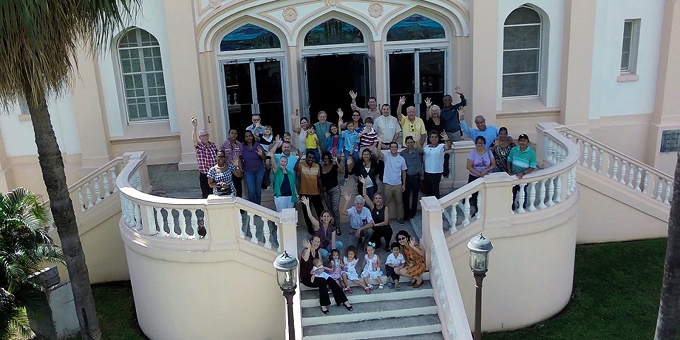
Church Divas and Doers
by Phil Edmonston — president, Balboa Union Church
Jesus, who certainly was a Doer, not a Diva, had this simple rule for church-building: follow the Gospel:
The Wise and Foolish Builders
“Cualquiera pues que me oye estas palabras, y las hace, le compararé á un hombre prudente, que edificó su casa sobre la peña:
Y descendió lluvia, y vinieron rios, y soplaron vientos, y combatieron aquella casa: y no cayó; porque estaba fundada sobre la peña.
Y cualquiera que me oye estas palabras, y no las hace, le compararé á un hombre insensato, que edificó su casa sobre la arena;
Y descendió lluvia, y vinieron rios, y soplaron vientos, é hicieron ímpetu en aquella casa; y cayó, y fué grande su ruina. (Mateo 7: 24).
Jesus taught us that a church is more than bricks and mortar.
It’s people who are faith-inspired Doers: Humble souls who work for free, give, rather than take, and think of others first.
Divas are quite the opposite. Jesus calls them self-absorbed, hypocrites:
How can you say to your brother, ‘Let me take the speck out of your eye,’ when there is the log in your own eye? You hypocrite, first take the log out of your own eye, and then you will see clearly to take the speck out of your brother’s eye (Matthew 7: 4).
Divas seek prestige, without earning it, want power, but won’t share it with others. They promise results, but only produce excuses, and worst of all, they only see the church as a cow to be milked for money or other benefits.
Balboa Union Church is 103 years old. Created by an Act of Congress thanks to President Theodore Roosevelt, the church is built on a rock that is solid enough to have withstood revolution, invasion, several recessions, Ricardo Martinelli, and its share of Divas.
Fortunately, Divas don’t stay around long. After creating disunity, they usually run out when their benefits run out. Then, the faithful Doers, the Lord’s true servants, return to pick up the pieces and rebuild the congregation. Call it: “Evangelical Evolution.”
Our church’s congregation has had a rocky conservative past.
When I walked through these doors in 1961, I was a young Army Medic from the streets of Washington DC. That Sunday, I saw a beautiful building filled with hundreds of white faces and in a large part of the back section were Panamanian, Afro-Antilleans, and African-American worshipers. They had been told where to sit. Not out of love, but out of what the ante-bellum South called our “unique institution.” Remember, the Canal Zone was filled with American soldiers and engineers, many who were brought up in the South and embraced that military legacy and social values.
I walked out.
In the late ’60s the church, through Reverend Payne and others, ditched the ‘reserved’ seating for minorities and withstood tons of criticism for it. More black-and brown-skinned members came on board. But, soon after the Canal Zone reverted back to Panama, the church became a ghost.
Yet, black and brown and some white Zonians remained. One Zonian woman bequeathed over $120,000 to the church, which purchased a decade ago, the land we are praying on. By the way, our church rarely mentions her name. Sad.
Times changed, people of any race sat where they wanted, elected to Council whomever they wanted and softened the Protestant doxology to be more ecumenical. It was money from this new multi-racial Baptist, Methodist, and Protestant minority that also saved the church.
It was a time of optimism. Panama’s new American ambassador, Jack Vaughn arrived three months after the January 9th 1961 protests for Panama sovereignty. Vaughn was an ambassador’s ambassador. An ex-boxer, Peace Corps director, and president of Planned Parenthood, Vaughn and the BUC congregation were inspired by President Kennedy’s 1961 injunction:
“My fellow Americans, ask not what your country can do for you, ask what you can do for your country.”
BUC’s ecumenical destiny was recast.
With only a couple of hundred members, BUC became a church of Doers. They organized weekly English language classes, periodic visits to local prisons, and assistance to medical missions in visits (giras) to the Interior. The church founded five outreach missions serving seniors, children and the hungry, from Panama City, to Chilibri, to Santiago.
Most of the Divas disappeared, either by going back to the States, staying away from church, or joining evangelical groups.
The Doers have returned and I promise to, again, work hard with them. Here: are some changes we should consider:
Abandon the entitlement mentality. Your church is not a country club where you pay dues to get your perks and privileges. It is a gospel outpost where you are to put yourself last. Don’t seek to get your way with the music, temperature and length of sermons (Source: Thom Rainier).
No one receiving pecuniary benefits from the church can hold an elected church position. The church must never be an ATM machine from which a charismatic pastor, or unaccountable administration can siphon members’ offerings.
Stop wasting time in unproductive meetings, committees and business sessions. Wouldn’t it be nice if every church member could only ask one question or make one comment in a meeting for every time he or she has shared his or her faith the past week?
Stop focusing on incidentals. Satan must delight when a church spends six months wrangling over a bylaw change. That’s six months of gospel negligence.
Stop shooting our own. This tragedy is related to the entitlement mentality. If we don’t get our way, we go after the pastor, the staff member or the church member who has a different perspective than our own. Don’t let bullies and perpetual critics control the church. Don’t shoot our own. It’s not friendly fire.
Are all the above changes an “Impossible Dream?” No, we have taken this voyage before, we will do it again, and we shall win again. It’s a trip that sharpens our skills and enhances our Christianity.
Take inspiration from Man of La Mancha:
“Soñar lo imposible soñar.
Vencer al invicto rival,
Sufrir el dolor insufrible,
Morir por un noble ideal.
Saber enmendar el error,
Amar con pureza y bondad.
Querer, en un sueño imposible,
Con fe, una estrella alcanzar.
Ése es mi afán
Y lo he de lograr,
No importa el esfuerzo,
No importa el lugar.
Saldré a combatir y mi lema será
Defender la virtud aunque deba
El infierno pisar.
Porque sé que si logro ser fiel
A tan noble ideal,
Dormirá mi alma en paz al llegar
El instante final.
Y será este, mundo mejor,
Porque yo, sin rendirme jamás,
Busqué, en mi sueño imposible,
Poder una estrella alcanzar.”
“Soñar lo imposible significa llevar la contraria al mundo, mantener un idealismo en su estado más extremo, pero puro a su vez. Don Quijote decide luchar por su ideal. Don Quijote tiene fe en lo que hace, cree en ello con fuerza, por eso no nos cabe duda en ningún momento de que vaya a ser capaz de alcanzar cualquier estrella que se le antoje.”
Former United States President Barack Obama summarized Quijote’s soliloquy with two simple words: “Si, podemos.”
~ ~ ~
These announcements are interactive. Click on them for more information.
Estos anuncios son interactivos. Toque en ellos para seguir a las páginas de web.













